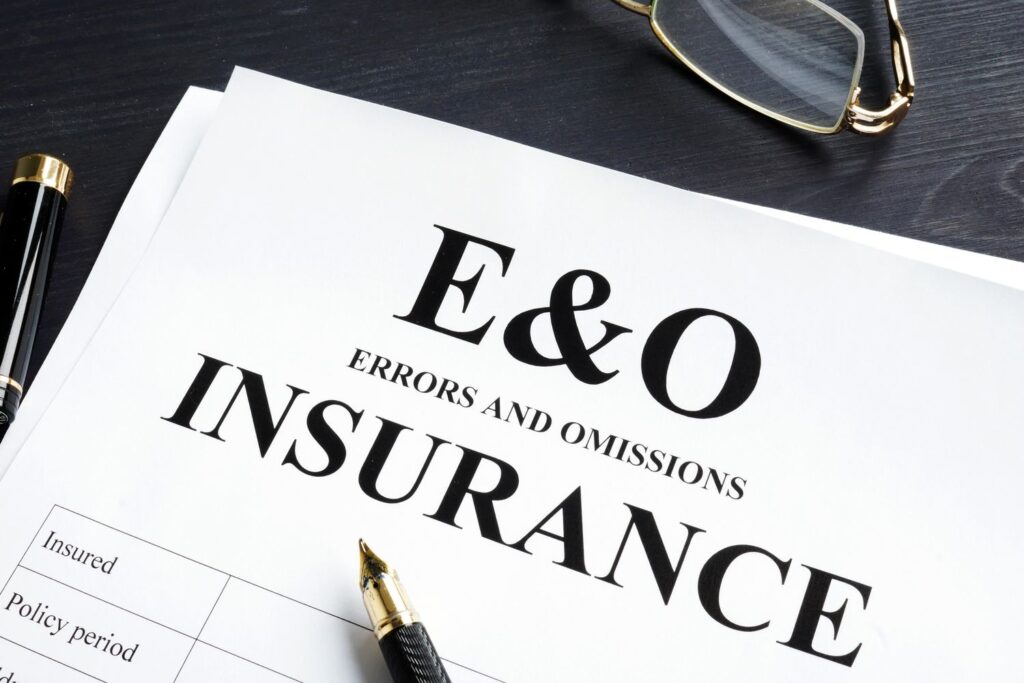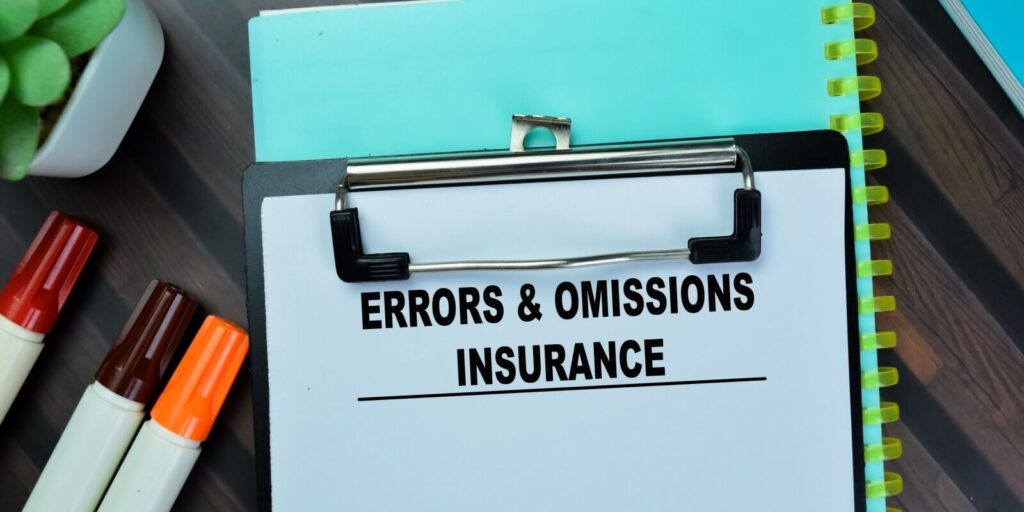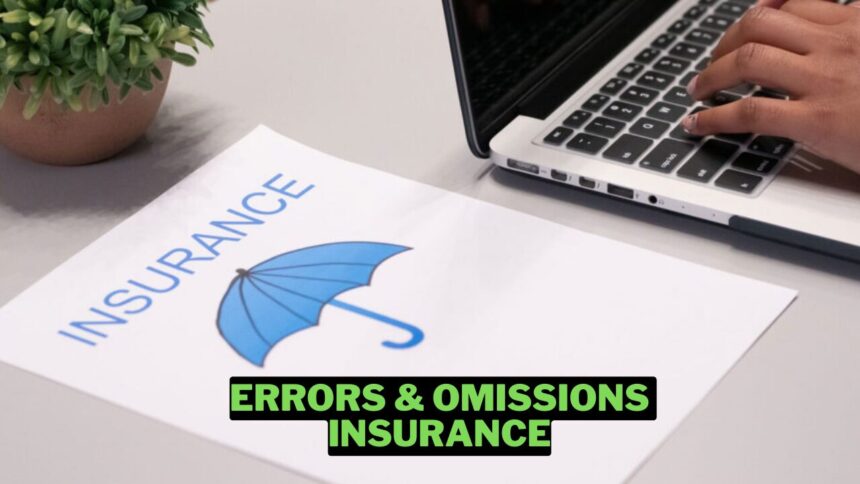Errors and Omissions Insurance, also known as E&O insurance, is a specialized form of insurance coverage to safeguard businesses, their employees, and other professionals from potential legal claims arising from substandard work or negligent behavior.
What Is Errors and Omissions Insurance?

Errors and omissions insurance and professional liability insurance serves as a safeguard for your company against legal actions alleging mistakes or errors in the professional services you provide.
By obtaining this insurance, you can mitigate the financial burden imposed by court expenses or settlements, which can be exorbitant for your business to handle.
Understanding Errors and Omissions (E&O) Insurance

E&O insurance is a type of liability insurance that safeguards businesses from the financial burden of a claim filed by a client against a professional offering guidance or services.
This coverage is commonly sought after by consultants, financial advisors, insurance agents, and lawyers, among others. By obtaining this form of business insurance, companies can protect themselves in the event that they are accused of committing an error or mistake.
When companies offer services to customers in exchange for a fee, it is common for them to acquire Errors and Omissions (E&O) insurance. This type of insurance can be purchased from various well-known commercial insurance providers.
However, companies operating from a home-based office need to obtain a separate policy as they are not eligible to include errors and omissions insurance under a homeowner’s policy.
What Does E&O Insurance Cover

Errors and omissions insurance helps protect business owners from claims of:
- Negligence
- Errors in services given
- Omissions
- Misrepresentation
- Violation of good faith and fair dealing
- Inaccurate advice
If a person files a lawsuit against your company for an error or omission in the professional services you have rendered, Errors and Omissions Insurance can provide coverage for the following:
- Legal expenses can range from $3,000 to $150,000 on average.
- Expenses related to court proceedings such as booking a courtroom or compensating expert witnesses can be covered by E&O.
- Expenses related to assembling your defense, such as compensating office managers or court reporters, can be covered by this insurance.
- Compensation and legal verdicts, with potential expenses ranging from a few thousand to several million dollars.
Errors and omissions insurance only helps cover claims if:
- It’s filed within your policy period or the extended reporting period.
- The incident occurred on or after your retroactive date.
The retroactive date is a specific date stated in your Errors and Omissions Insurance policy that determines when incidents are eligible for coverage. It ensures that any events occurring on or after this date can be included in your insurance coverage.
On the other hand, the extended reporting period provides coverage for claims filed within a certain timeframe after your policy expires. The retroactive date holds significance because some events that may result in a client’s loss may only become apparent years later, often when a court summons is received.
By having an older retroactive date, you gain more protection against past events that have not yet come to light.
What E&O Insurance Does Not Cover

Errors and Omissions Insurance policies do not provide coverage for criminal prosecution or certain liabilities that may arise in civil court and are not specifically listed in the policy. This includes illegal acts, intentional wrongdoing, or criminal activity.
Additionally, E&O insurance typically does not cover bodily injury caused by your business, as this is usually covered by general liability insurance. Errors and Omissions Insurance, also known as E&O insurance, provides coverage for professional liability claims.
However, it is important to note that there are certain limitations to what E&O insurance may cover. For instance, it may not provide coverage for claims related to temporary employees, claims arising from work completed prior to the policy being active, or claims in different jurisdictions. Additionally, E&O insurance may not cover information breaches caused by cybercrime,
Who Needs E&O Insurance

If you are a business that offers services to customers, it is important for you to have errors and omissions insurance. This type of insurance is necessary for various professionals, such as:
- Website developers
- Consulting companies
- Barbershops and hair salons
- Printing and publishing companies
- Pet services, such as veterinarians and pet groomers
- Real estate agents
- Accountants
- Engineers and engineering firms
- Advertising firms
- Educators
- Marketing firms
Professionals in the insurance, real estate, and financial industries, including insurance brokers, insurance dealers, realtors, registered investment advisors, and financial planners, have the option to acquire Errors and Omissions (E&O) insurance.
E&O insurance is often mandated by regulatory bodies like insurance regulators, the Financial Industry Regulatory Authority (FINRA), or even by a company’s investors. E&O insurance is not limited to the financial industry.
It is also applicable to various other businesses, such as nonprofits, general maintenance companies, contractors, and engineering firms. Additionally, professionals and companies that provide services like wedding planners and printers are also in need of E&O insurance.
Furthermore, medical professionals like doctors and dentists have their own version of E&O insurance, known as malpractice insurance. In certain cases, a financial advisor or broker may face a lawsuit from a client if an investment turns out to be unsuccessful, regardless of whether the client was aware of the risks involved and the investment was within their agreed-upon guidelines.
Even if the court or arbitration panel rules in favor of the broker or advisor, the legal expenses can be substantial, highlighting the significance of Errors and Omissions (E&O) insurance.
E&O Insurance Cost
The price of an Errors and Omissions Insurance policy is influenced by various factors, such as the type of business being covered, its geographical location, and the history of previous claims that have been settled.
If a person or company has faced multiple legal problems, they are considered to have a higher risk and may find that E&O insurance is more costly or less advantageous in terms of its coverage. Typically, E&O insurance costs approximately $500 to $1,000 per employee annually.
Coverage limits
The higher your policy limits, the more coverage you’ll have, which usually means higher premiums.
- Business risk
- If your business operates in a high-risk industry, it is probable that you will be charged a higher rate for errors and omissions insurance. For instance, a financial consulting company that provides advice on investing significant sums of money is likely to have a higher premium compared to a smaller financial advisor.
- Claims history
- If your business has a track record of liability claims, it is likely that you will have to pay higher premiums for your Errors and Omissions Insurance coverage.
- Location
- The cost of insurance may differ based on the location of your business. If your business operates in a bustling city, you can expect higher insurance rates.
Why Is Errors and Omissions Insurance Important?
If a financial professional makes a mistake or omission during the application process, consultation, or investment decision, they can be sued by a client who experiences a loss. Errors and Omissions (E&O) insurance provides coverage for the financial professional’s legal expenses and any compensation that may be awarded to the client.
Other types of business coverage you may need

You may want to consider other types of business insurance to help protect you against scenarios not covered by errors and omissions insurance. For instance:
- Product liability insurance
- Product liability insurance is a type of coverage that assists in covering the costs incurred when a product manufactured, designed, or sold by your business causes harm to someone else or damages their property.
- Commercial general liability coverage
- Commercial general liability coverage is usually included in a regular business owner’s policy. It provides financial assistance for expenses like legal fees or medical bills of individuals who suffer injuries due to an accident at your business.
- Employment practices liability insurance
- Employment practices liability insurance provides financial protection by covering the legal costs in the event your business faces a lawsuit from an employee or contractor. This kind of coverage applies to specific situations like claims of discrimination, retaliation, or wrongful termination.
- Non-owned auto liability insurance
- Non-owned auto liability insurance is designed to provide coverage for situations where employees use their own personal vehicles for business purposes instead of company-owned vehicles. This insurance is intended to financially protect the policyholder by covering the expenses related to medical bills or property damage caused by their employees in the event of an accident during work hours.
- Data compromise coverage
- Data compromise coverage is a type of coverage that assists businesses in covering specific expenses that arise from a data breach. These expenses may include the creation of informational materials, provision of credit monitoring services for individuals affected by the breach, or even financial assistance with legal fees associated with
Errors and omissions insurance is a form of liability coverage that can be advantageous for small business owners.
It is essential to comprehend the workings of various liability protections and select the appropriate coverage that aligns with your requirements.
This will enable you to operate your business with enhanced tranquility.






This article provides a clear explanation of what Errors and Omissions Insurance is and who needs it. It’s important for businesses offering professional services to have this insurance to protect against potential legal claims.
I found this article to be very informative. It’s interesting to learn that Errors and Omissions (E&O) insurance is not limited to the financial industry and is applicable to various other businesses. It’s important for small business owners to understand the different types of liability coverage available to them.
I found this article to be informative and helpful in understanding the importance of Errors and Omissions (E&O) insurance. It is interesting to learn that E&O insurance is not limited to the financial industry and is applicable to various other businesses as well. I also appreciate the information provided about other types of business insurance that may be necessary to consider. Overall, this article emphasizes the significance of having the right insurance
Errors and omissions insurance is an important coverage for professionals in various industries. It’s interesting to learn that it’s not limited to just the financial sector. It’s also helpful to know about other types of business insurance that may be necessary to protect against different scenarios. Overall, this article provides valuable information for small business owners.
This article provides a clear explanation of Errors and Omissions Insurance and its importance for businesses. It highlights the coverage provided and the limitations of the insurance policy. It is crucial for professionals in various fields to consider obtaining this insurance for protection against potential legal claims.
This article provides valuable information about Errors and Omissions (E&O) insurance and its importance for professionals in various industries. It highlights the factors that influence the cost of E&O insurance and the need for other types of business coverage. Understanding these liability protections is crucial for small business owners to operate with peace of mind.